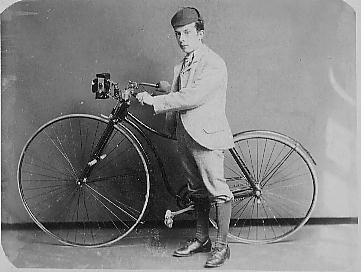Jevons Paradox and Peak Oil
I happened to catch the tail end of the Congressman Bartlett's Peak Oil conference on CSPAN. (Transcripts one, two, and three courtesy Energy Bulletin.) John Howe came on last, in a presentation that was unfortunately somewhat disorganized.
One thing he mentioned caught my attention: He related to Jevons Paradox to a previous speaker, Donald Wulfinghoff:
So another kind of delusion is that efficiency will save us. Well, there (are) wonderful things about efficiency. I certainly defer to my co-speaker here. Efficiency, we have to get every bit of reduction of usage that we can find. But in the long run many times better efficiency has led to more consumption. This is called Jevons paradox. When we have better efficiency, the price goes down and people use more, and this is what’s happened time and time again. So efficiency is a tiny step in the right direction. You can’t argue with hybrids. They are more efficient, but they’re just a tiny step.
Wulfinghoff gave an excellent, content rich presention-- the only real problem, as he pointed out is to make buildings more efficient you must build them correctly -- and design them correctly. There are limits to retrofitting. There are also limits to rebuilding a century of plastic drywalled infrastructure.
What I really want to highlight, however, is that Jevons Paradox, (perhaps Jevons Effect might be a better name) will be meaningless after peak oil, when supplies of energy are in decline. (Temporary or otherwise.)
Conservation and efficiency will be absolutely necesary. People will no longer have the luxury of trading in their SUV for a Hummer. So it is silly to invoke Jevons Paradox as reason to pooh-pooh efficiency (and perhaps, extoll the virtues of ones clever solar powered tractor.) Not to ding Howe too much here -- he just made the mistake of mixing up the present with our future. (Say, after Thanksgiving or so.)
Every drop of energy, and every idea, will be needed to keep food production and distribution rolling.
Speaking of rolling:
More bicycles than cars have been sold in the United States over the past 12 months, with rising gas prices prompting commuters to opt for two wheels instead of four.
Now, admittedly, bicycles are efficient, so maybe this is an omnious sign of the coming apocalypse. (Badum-ching.)

3 Comments:
It never fails to amuse me when the more frenetic and illogical types make arguments which imply that Jevon's Paradox will create oil where there is none. It's like they have no connection between their brains and their fingers, or at least not between ideas in their heads.
A pity that we can't require the ability to see and form such connections as a qualification for voting. We'd get much better government.
In fairness to Howe -- that wasn't the exact argument he was making, although I thought his argument was itself nonsensical. (And he really did talk about his solar powered tractor.)
Energy has been taken for granted for many, many years. That is now painfully changing.
I am all for electric lawn-care equipment, whether they are solar-charged GE Elec-Tracs or otherwise. The gas-powered ones are noisy, smelly and otherwise bad neighbors.
Looks like Howe is at least marginally smarter than Godesky.
Post a Comment
<< Home